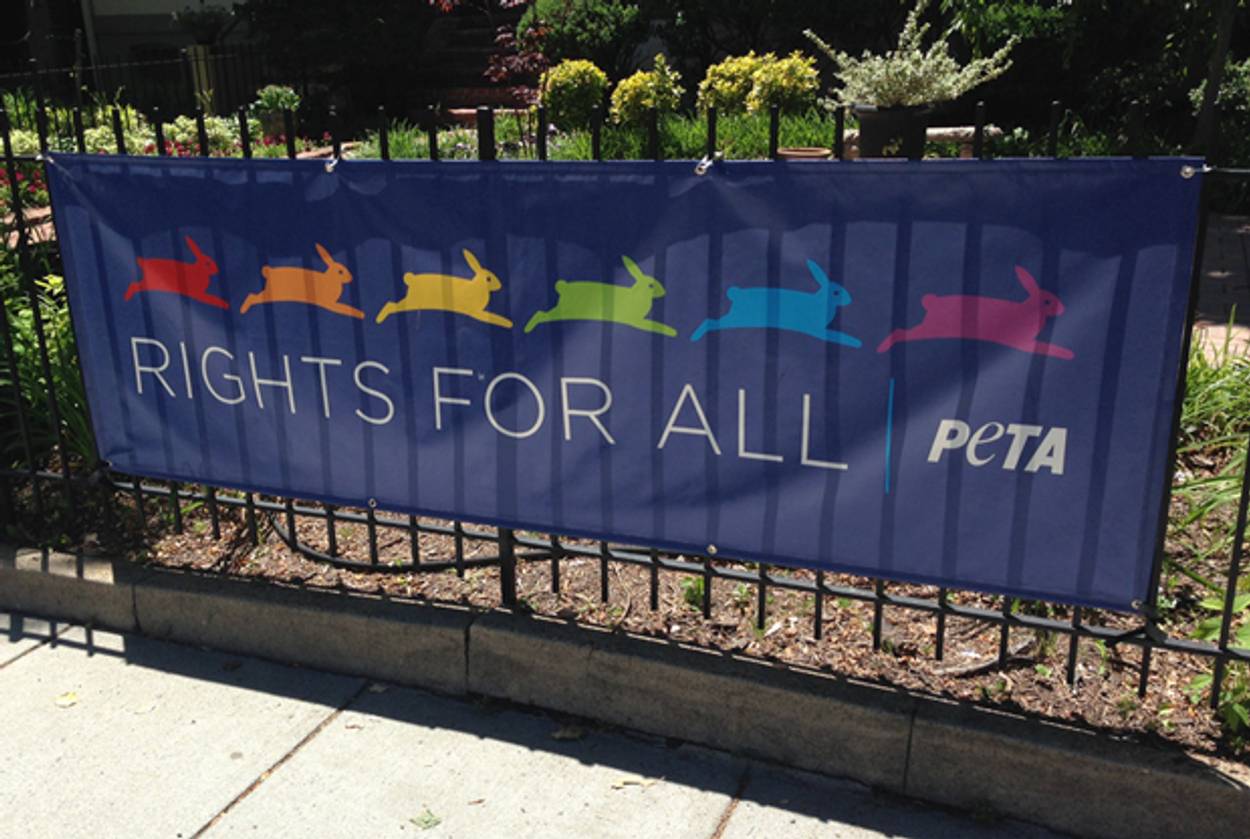Hate Is Always Wrong—No Matter the Victim
PETA responds to Tablet’s article about the organization’s latest campaign




As an openly gay man and the senior vice president of campaigns for PETA (where I’ve worked since 1985), I’m perplexed by James Kirchick’s take on our “Rights for All” banner. Much of the gay community has long embraced animal issues. PETA’s most notable celebrity spokespeople have always included gay icons, including k.d. lang, members of The B-52s, Tim Gunn, the duo from Erasure, Martina Navratilova, Lady Bunny, and Alan Cumming. Gay kids know what it’s like to be bullied for being different, so it’s hardly surprising that many of us grow up speaking out against all forms of mindless prejudice—including prejudice against animals.
I first made this connection when I was in school, where I got beaten up for being gay. I vividly remember lying on the ground, gasping for breath, surrounded by other kids who were looking down at me and laughing. Around this same time, I went on a fishing trip and caught a large flounder. When I pulled the animal onto the boat, the fish was gasping for breath, too. At that moment, the flounder was the only other being I could relate to, and I realized that I had become the bully.
Just as it is always wrong to bully and abuse people simply because they’re different—whether they are Jews, women, gays or people of color—it is always wrong to abuse and oppress animals. The mindset is the same in both cases. Prejudices of any stripe arise when we start to believe that “I” am important and “you” are not, that my interests somehow trump those of other living beings.
PETA’s “Holocaust on Your Plate” exhibit graphically pointed out the shared experiences of all those who are oppressed, human or animal. Today, billions of animals are slaughtered, experimented on, shot, poisoned, beaten, shackled, drowned, and dissected. This happens routinely, despite our ability to choose other options and even though scientific proof and common sense show that animals experience love, pain, joy, loneliness and fear, just as we do. It happens because we dismiss those feelings as inconsequential.
Although it’s still taboo in the larger Jewish community to draw any comparisons to the Holocaust, many Jews, myself included, have responded to the lessons of history by reconsidering humans’ treatment of animals, acknowledging, for example, that the animals who are raised and killed for food by the billions every single year are also victims of violence.
In fact, the “Holocaust on Your Plate” exhibit was largely inspired by Nobel Prize–winning Yiddish author Isaac Bashevis Singer, who fled from Poland to the United States in 1935. He took a room above a slaughterhouse in Chicago and watched as cows were prodded, kicked, and sworn at as they were herded down a ramp to their deaths. He was one of the first public figures to make “the dreaded comparison” between the treatment of animals in slaughterhouses and the treatment of Jews, Gypsies, gays and others characterized as “life unworthy of life” during the Holocaust, and he became a lifelong vegetarian. I launched the exhibit in his native Warsaw, using his own words to make the comparison, and was heartened to receive an overwhelmingly positive response from the Polish intelligentsia and media.
It’s easy to shake our heads in disgust at what others before us have done but extremely difficult for us to examine what biases and prejudices we hold today. Although animals’ lives are as important to them as ours are to us, we treat them as slaves, hamburgers, handbags, toys and test tubes. We kill billions of chickens, cows, pigs and other animals for our dinner plates, even though we have an abundance of healthier, vegan options. We rip the skin off snakes and foxes for fashion accessories and drip chemicals into rabbits’ eyes to test shaving cream and shampoo. We tear social, intelligent elephants away from their families, beat them and force them to live in shackles for our “entertainment.”
I believe that those of us now working to break down the prejudices that cause animals to be treated as “life unworthy of life” would have been working, in an earlier time, to abolish human slavery and Nazi death camps. We are the same people who advocate for marriage equality and women’s rights today. Prejudice in all its ugly forms is wrong—it doesn’t matter who the victim is—and when we witness it, we should never let it go unchallenged.
Dan Mathews is senior vice president of PETA.
Dan Mathews is senior vice president of PETA.